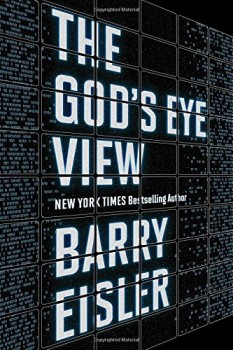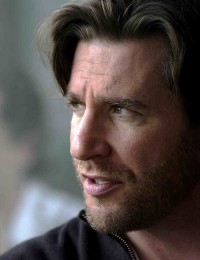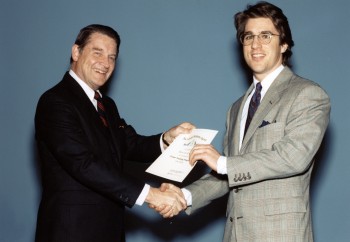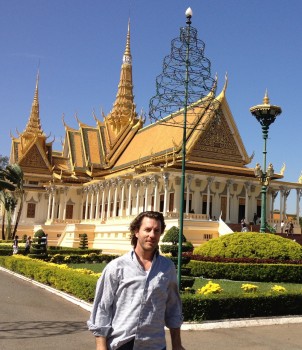Between the Lines with Maverick Novelist Barry Eisler
What Happens If Our Government Takes Surveillance One Step Further
 By Josie Brown
By Josie Brown
An interview with author Barry Eisler is always timely and provocative, to say the least. A prolific author, this former CIA operative and attorney has landed on numerous bestseller lists with novels based on his iconic assassin anti-hero, John Rain. He has won both Bouchercon’s Barry Award and Mystery Inc.’s Gumshoe Award.
Those who read his blog know that Eisler is a staunch public advocate of human rights—a topic covered in his latest thriller, THE GOD’S EYE VIEW—as well as authors’ rights. Since both are hot topics for those of us who write (and read) thrillers, yes, you’ll want to read what he has to say.
When, and how, did the idea for THE GOD’S EYE VIEW come to you as a plot device?
I’m pretty obsessive about post-9/11 government overreach—torture (“enhanced interrogation”); indefinite imprisonment without charge, trial, or conviction (“detention”); execution of American citizens without any recognizable due process (“targeted killings”); and, of course, suspicion-free, bulk population surveillance (“data collection”).
As I follow these trends, I like to read between the lines, grappling with what’s being reported while imagining what isn’t. So when I was reading the news stories based on Edward Snowden’s whistle-blowing, I remembered one of the things they taught me at the CIA—that sometimes it pays to cover up the commission of a serious crime by confessing to a lesser one. The programs Snowden revealed were appalling, yes, but what would be the even worse ones, the ones that would leak later, if at all?
My answer to that question—informed by the abuses of the J. Edgar Hoover years, the history of COINTELPRO, the allegations of NSA whistle-blower Russ Tice, and most of all by Snowden’s revelations themselves—became the foundation for THE GOD’S EYE VIEW, with an all-seeing surveillance state the novel’s milieu. In fact, Jeremy Bentham’s Panopticon—the circular prison in which a central watchtower would simultaneously monitor all the prisoners—became a kind of motif for the novel.
In light of the Edward Snowden revelations on US surveillance protocol, the veil has been lifted from the eyes of the American public as to how our basic rights of privacy have been violated. It also gives thriller writers great plot fodder. What was your reaction to these leaks as (a) a former CIA operative, (b) an attorney, (c) an American citizen, and (d) a thriller writer?
As former CIA, I was saddened. Intelligence officers are entrusted with a lot of power relative to the public, and it’s always disturbing and dispiriting to see that power turned against the people for whose benefit it should be exercised. Though I was heartened to see that at least one of those officers—Snowden himself, of course—had the conscience and courage to take seriously his oath to protect and defend the Constitution (that’s the real oath; the notion that there’s a secrecy “oath” is pure ignorance and propaganda). Let’s hope others will follow his example, as seems to be happening.
As an attorney not unfamiliar with the 4th Amendment, I thought, Can’t wait to see how they’re going to spin this one. And, happily, they haven’t really been able to—the NSA’s bulk surveillance programs have taken a righteous pounding in federal courts, being declared illegal, unconstitutional, and even Orwellian (something perhaps to consider for anyone who wants to claim Snowden is other than a whistle-blower). No wonder the government has tried so assiduously to keep us in the dark.
As an American citizen, I was disturbed and disgusted. These are programs the Stasi would have envied. No organization can be entrusted with this kind of secret power without it slowly strangling the democracy it’s ostensibly intended to protect.
As a thriller writer, I thought, Did Christmas come early? Because no one serves up great plots for thriller writers like the US government. As a citizen, I abhor government corruption and criminality and do what I can to fight it. But as a novelist, I recognize gold when I see it.
That said, I do like to think my novels are in some small way part of the fight.
THE GOD’S EYE VIEW heroine, Evelyn Gallagher, is a NSA tech operative who works with facial recognition software. She is also a smart, serious single mom in what could aptly (if tritely) be described as “a man’s world.” Not to sound sexist, but not all male thriller writers write heroines well. And yes, I can say the same about many female suspense novelists regarding their male heroes: It seems that the easiest course of action is to create an ideal, as opposed to real person, warts and all. However, you do a wonderful job fleshing out Evie. You make us care about her. In fact, all of your protagonists and antagonists are fully fleshed out. What is your process for creating a character?
That’s a nice compliment—thanks. I don’t know if I have any super useful insights about how to write compelling characters of the opposite sex, other than to note that my general approach to any character is to try as much as I can to feel like that character. I take a lot of walks and think about the character—who she is, where she comes from, what are her hopes and fears, what does she think she wants, what does she really want, what were her formative experiences, what are her relationships, what motivates her…things like that. And I use all that to try to see the world through the character’s eyes, to feel what she feels, get a notion of the way she talks and carries herself. I think it might be a little like acting, in that so much of it has to do with how I want to feel like the character, as though I’m in her world, her head.
The exercise requires a lot of thinking and concentration, and I wouldn’t say it’s easy. But for me, there’s no real shortcut. When I teach writing and encounter flat dialogue, most of the time I attribute it to the fact that the writer doesn’t yet know her characters, and the fix isn’t usually to try to revise the dialogue directly, but rather to find a way to understand the character better, to feel like the character, so the dialogue flows more by itself. So again, it’s not easy, but I don’t find it any more challenging when writing a woman than I do when I’m writing any character who isn’t me. Ask, what’s it like to be this character? And you’re off and running. Or, at least initially, walking and maybe even stumbling, but you have to start somewhere.
I love it when characters grow within a story. Real people aren’t black or white, but a chiaroscuro of emotions and morals. Which brings me to a device you use to give your antihero, Manus, another layer: he is deaf—as is Evie’s son, Dash. How did you decide on that as an affliction that would work for your characters, and for that matter, your plot?
I wanted Manus to have some disability, something that would make him feel cut off, alienated, different, apart. And then I realized Dash would have that disability, too, and it would cause them to bond. It might have been anything, but I happened to be reading Andrew Solomon’s fantastic book Far from the Tree: Parents, Children, and the Search for Identity while planning THE GOD’S EYE VIEW, and the chapter on deaf culture was just pure serendipity. For a lot of reasons—including the way deafness can cut a person off from various aspects of the hearing world, while forging powerful bonds within the deaf community. In fact, there are arguments (fascinating and provocative, though a little beyond the scope of our discussion here) about whether deafness should even be considered a disability. All of which made deafness a perfect aspect of Manus and Dash as characters and the initial basis of their connection.
Your plots go beyond high-concept headline grabbing, to the real nitty-gritty nuts and bolts. When you decide on a subject to tackle, what is your methodology for research?
By the time I start writing, most of the political backstory research has already been done—because I read, think, talk, and write so much about these topics.
But more generally, my research method involves three steps. First, Internet knowledge. Internet knowledge gets a bad rap, but the rap is built on the misuse of Internet knowledge, not on any shortcoming intrinsic to Internet knowledge itself. Properly used, Internet knowledge should provide a better understanding of what you know and what you don’t know; what questions you need to ask and where and how you can set about answering them; and overall a kind of foundation you can start to build on. For all this, the Internet is an incredibly useful tool. The most common problem with Internet knowledge is that people can confuse it with expertise, and it’s this conflation that has led to the bad rap. Internet knowledge is a tool, and like any tool, it’s good for some things and bad for others. Use it properly, for the right purpose, and you can get great results.
Once the Internet knowledge part is largely in place, I do more focused research, typically involving books, visits to the places I’m writing about, and interviews with experts. You can think of this deeper, more interactive research as the structure getting built on the Internet knowledge foundation.
Then there’s one more critical step. Once the manuscript is written, I show it, or select portions, to experts so they can help me fine-tune whatever I’ve written based on my research. This is akin to painting or polishing the structure, and for me always results in a few final changes I’m typically glad I got to make before publication.
It’s a pretty good approach, I think, but no system is perfect—and for anyone who wants to see the glitches that have slipped through despite my efforts, there’s the Mistakes page of my website. My readers enjoy it, and it helps keep me honest.
Your background gives you keener insights than most on our government’s geopolitical realities and political fallacies. What do you feel is the future of the U.S. government’s surveillance? What role do you feel the public needs to take in order to safeguard its rights?
You’re nice to tie my insights into my intelligence background, and I’m sure the background helps. But more important, I think, and more widely available, is just a little more thoughtfulness about what not just the dangers, but the guaranteed outcomes, of unaccountable government power. Anyone who believes programs like COINTELPRO and Operation Mockingbird were anomalies limited to a peculiar set of historical circumstances and having nothing to do with immutable laws of human nature, or that the Stasi and KGB were artifacts of foreign cultures and could never take root in what we’re told is a democracy, or that something about America is inherently antithetical to the growth of an oligarchy, is engaging in some pretty powerful denial. And denial, as the saying goes, has no survival value.
In 2011—time flies, doesn’t it?—you were one of the first high-profile novelists to make the leap to self-publishing: shocking traditional publishers, but applauded by other novelists for stepping away from a two-book, half-million-dollar deal with St. Martin’s Press. You then moved on to Amazon’s thriller imprint, Thomas & Mercer, in a deal that is a hybrid of both publishing models. In the five years since, a lot has changed in how our books are put in the hands of readers. What do you find are the constants in the life of a novelist-as-businessperson? At the same time what do you feel are its wild cards?
I always feel a little uncomfortable when the story gets framed as my having walked away from an offer from St. Martin’s Press. Not that it’s inaccurate; it just makes it sound as though I had a problem with SMP, which wasn’t at all the case. Among the Big Five, I think SMP is as good as any and better than most. My reasoning was about changes in the industry—particularly the shift to digital I was seeing in my own sales—as well as about time-to-market and control over business decisions. For anyone interested in more on this topic, I recommend a free, downloadable book novelist J.A. Konrath and I wrote on the topic, Be the Monkey, and some of the links on the Resources for Indie Writers page of my website.
The constants…well, writing a book in the face of innumerable real-world and online distractions is probably never going to get easier. And as much of your business as you might be able to outsource if you’re lucky enough to find good people to whom you can delegate, ultimate responsibility will still be yours. That’s a burden, in one sense, but really more of a privilege.
The wild cards…hmmm, if I had a good answer to that one, it wouldn’t be a wild card, right? But I’ll say this: I don’t think trends at B&N are as well understood as they might be. If B&N goes under, it would obviously be cataclysmic for an industry built on a foundation of paper distribution. But there’s another, more subtle possibility that would have a similar effect. What if B&N continues to devote more and more shelf space to more profitable non-book items? Just something to think about, and perhaps to hedge against, if you’re able.
On the other hand, Borders’ bankruptcy seems to be correlated with a renaissance of indie bookstores, and it’s possible the shrinking or disappearance of B&N could bolster that trend.
And one other dynamic that’s perhaps not as well understood as it could be: the relationship between, and difference between, digital books vs paper books, on the one hand, and online distribution vs brick-and-mortar distribution, on the other.
For example, a lot of people think self-publishing means only digital books. It doesn’t—the books of every self-published author I know are also available in paper, through print-on-demand services like CreateSpace. But those self-published paper books are rarely distributed through brick-and-mortar outlets, and are instead generally available only through online retailers. In other words, self-publishing isn’t a pure digital book play, but it is generally a pure online distribution play.
Conversely, legacy publishing is often thought of as primarily a paper books play, but it would be more accurate to understand legacy publishing as primarily a brick-and-mortar distribution play.
Nothing inherently good or bad in any of the foregoing, by the way; it’s just important to understand the nature of publishing systems as accurately as possible.
But what happens if paper book buying continues to migrate to online distribution? That is, what happens if more and more readers want to buy their paper books from online retailers? A trend like that would undercut the primary strength of legacy publishing, which again is not paper as such, but rather brick-and-mortar distribution.
Will it happen? I don’t know. But it’s a dynamic to be aware of.
What do you feel is the next big challenge for authors, be they traditionally published, or self-published?
 Discoverability is the eternal challenge for all new writers. New tools and techniques will emerge, of course, but the challenge will persist because it’s rooted in physics—there are always more good books than anyone can keep up with. Publisher Tim O’Reilly famously noted that the real danger for authors isn’t piracy; it’s obscurity. Nothing about the revolution in publishing has changed this, and I don’t see anything that ever will.
Discoverability is the eternal challenge for all new writers. New tools and techniques will emerge, of course, but the challenge will persist because it’s rooted in physics—there are always more good books than anyone can keep up with. Publisher Tim O’Reilly famously noted that the real danger for authors isn’t piracy; it’s obscurity. Nothing about the revolution in publishing has changed this, and I don’t see anything that ever will.
And what is your next big challenge, both professionally and personally?
Well, I’m 52 now, and the workouts sure aren’t getting any easier! So I guess trying to keep doing some of the things I’ve always liked to do without excessive visits to the chiropractor will be one challenge.
The professional challenges are likely to be variations of the eternal challenges: focusing on the writing and not getting distracted by my obsessions with political issues like torture, metastatic surveillance, and the rule of law; coming up with characters and stories people will want to keep reading for years to come; trying to accurately and dispassionately understand the tides of the book business so I and others can keep on surfing and avoid any rogue waves.
- Up Close: Jane Smiley - November 30, 2022
- Up Close: Lisa Barr - February 28, 2022
- Up Close: Kaira Rouda - December 31, 2021


